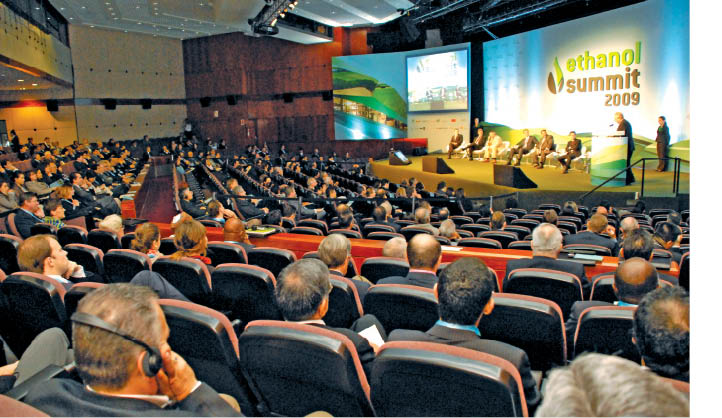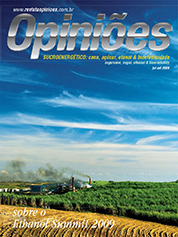Marcos Sawaya Jank
President of the Brazilian Sugarcane Industry Association (UNICA)
Op-AA-21
Realities that replace myths
In recent years, particularly since 2007, UNICA has been working on several fronts so that the Brazilian sugarenergy industry might reflect the reality of an activity that has been expanding and modernizing at a fast pace, setting aside old myths increasingly less anchored in facts, which some people still insist on associating with the industry on a broad basis.
This set of initiatives, of variable amplitudes and complexity levels, has been producing results that can already be perceived and were perhaps most visible during the 2009 Ethanol Summit, held in the beginning of June at the Sheraton World Trade Center in São Paulo. Like the first edition, which took place in 2007, the Summit once again turned São Paulo into the center of global attention concerning biofuels, with emphasis on Brazilian ethanol produced from sugarcane.
But, unlike the natural curiosity displayed by foreign specialists, who came more for the sake of getting to know the industry and the event in 2007, what we saw this time was a more intensive and qualified participation, in which visitors and Brazilians integrated in dozens of panels and debates, all of them visibly better equipped to explore the numerous paths that surround this topic.
It was a clear sign of the learning process our organization and a considerable number of others around the world have experienced, starting when so many saw in biofuels – and specifically in the highly successful and exemplary Brazilian solution – a possible route their own countries might follow, whether through their own production or imports.
More than that, it was a great pleasure to observe that efforts made in the last two years already allow us to believe that we are dealing not only with specialists, authorities, technicians and researchers better prepared for debating, but also with public opinion that is gradually maturing and acquiring a more precise and complete understanding, allowing many people to grasp the essential differences between production methods and specific types of biofuels.
These are perceptions that, among other aspects, confirm the value of the transparency and open door policy we have adopted vis-à-vis the Brazilian and international media. The Ethanol Summit showed us this new and better informed reality, not only in terms of the media coverage it received, but also in terms of the debates, in which spontaneity prevailed among those whose presentations brought us, with a great deal of authority, not just gains and advancements but also doubts that merit present and future attention, as was the case with consultant and quasi “inventor” of Corporate Social Responsibility, Britain’s John Elkington.
 The event also featured debates in which obvious differences in opinion were criteriously, objectively and carefully covered, with participants clearly aware that nowadays omitting facts does not bring good results – there is simply no future in telling only half the truth. A prime example of this type of exchange was the morning plenary session on day three of the event, which featured the President of the Renewable Fuels Association (RFA) of the United States, Bob Dineen, the President of the American Advanced Biofuels Association (ABFA), Mike McAdams, the executive Director of the European eBio Association, Rob Vierhout, Minister André Correia do Lago of the Brazilian Foreign Relations Ministry (Itamaraty), and the Chief Representative of UNICA for North America, Joel Velasco. On such occasions, it becomes clear why it was so important to “internationalize” UNICA, with the opening of offices in Europe and the United States, while at the same time taking more proactive and encompassing stances in the industry’s corporate communications strategies.
The event also featured debates in which obvious differences in opinion were criteriously, objectively and carefully covered, with participants clearly aware that nowadays omitting facts does not bring good results – there is simply no future in telling only half the truth. A prime example of this type of exchange was the morning plenary session on day three of the event, which featured the President of the Renewable Fuels Association (RFA) of the United States, Bob Dineen, the President of the American Advanced Biofuels Association (ABFA), Mike McAdams, the executive Director of the European eBio Association, Rob Vierhout, Minister André Correia do Lago of the Brazilian Foreign Relations Ministry (Itamaraty), and the Chief Representative of UNICA for North America, Joel Velasco. On such occasions, it becomes clear why it was so important to “internationalize” UNICA, with the opening of offices in Europe and the United States, while at the same time taking more proactive and encompassing stances in the industry’s corporate communications strategies.
This is how to clearly exhibit the results of many months of providing daily information to journalists from all over Brazil and around the world, or strengthening our relationship with countless entities inside and outside Brazil, through our offices in Brussels and Washington.
In assessing what people are saying after all these efforts that place incredible demands on the time of UNICA executives and consultants, who must engage in providing explanations that are necessarily repetitive, to make sure that themes are properly understood, we can conclude that the debate on biofuel, particularly the role of our sugarcane ethanol, is now much more qualified and balanced in comparison with the not too distant past.
One can also observe progress in the type of media coverage the industry gets, particularly with the Brazilian sugarcane industry at center stage and in the spot-light, as is the case when an event of the magnitude of the Ethanol Summit comes along. With almost 400 accredited journalists, producing news at times at a torrid pace for outlets from around the world, it is important to note that this fantastic volume of information generated at the Summit – more than 250 items in the print media alone, there were very few examples in which the content was in any way slanted or negative for the industry.
Quite the contrary: most of the news coverage had an essentially balanced content, based on science and facts. If it is a fact that every now and then news emphasizing old myths and dogmas still surfaces, it is also quite clear that this is becoming increasingly rare. The repetitive nature of this type of media exposure is another aspect that almost ensures that at some point in time, dubious interpretations of the facts tend to limit themselves to the reduced dimension they deserve – a dimension appropriate for what amount to isolated, remote instances that are not representative of the practices prevalent in the Brazilian sugarenergy industry.
It was not by chance that, considering this context of clear and perceivable progress brought about by the 2009 Ethanol Summit, the event was the stage for the official launch of two initiatives of great significance, which over time will contribute to leveraging the industry’s proactiveness. One is the RenovAção (RenovAction) Project, a powerful response to a reality that presents itself through the relentless expansion of sugarcane harvesting mechanization.
The result of the combined forces of UNICA, the Federation of Salaried Rural Workers of the State of São Paulo (FERAESP) and companies of international scope – Syngenta, Case and John Deere, with support from the Interamerican Development Bank (IDB) –, the project will requalify 7,000 people per year, mostly sugarcane cutters, in order to equip them to either take on other jobs within the sugarcane industry or perform in other sectors, in which there is a demand for labor in their communities.
The other major initiative, with actions already in progress, is the AGORA (Now) - Agroenergy and Environment Project, created to bring together the extensive sugarcane production chain, in what is a major joint communications and marketing effort carried out tobenefit not only those who produce sugarcane, ethanol and bioelectricity, but the entire huge network of institutions, companies and producers that, together, benefits the entire country with its commitment to sugarcane and its products.
AGORA arrives with a strong start, with five companies signing on from the outset: the Itaú-Unibanco holding company, Monsanto, BASF, Dedini and SEW-Eurodrive, plus essential support from entities such as Orplana, which congregates sugarcane suppliers throughout South-Central Brazil, several associations of sugar and ethanol producers at the state level, as well as the National Sugar-based Energy Forum.
Immediately after the Summit, we saw further, strong evidence of the new reality taking shape around the Brazilian sugar-energy industry, essentially based on concrete facts, plurality and cooperation, leaving aside conflictive and adversarial relations. In what was a remarkable event because of the constructive tone adopted by all protagonists, starting with the president and driving force behind that moment, Luiz Inácio Lula da Silva, we followed the launch of the National Commitment to Enhance Work Conditions in the Sugarcane Industry, a broad and already victorious alignment of workers, companies and the federal government that will privilege best practices in the industry, specifically regarding the manual cutting of cane, making those practices examples to be followed by all.
More than 400 people attended the launch at Buriti Palace in Brasília and were surely excited about the spontaneous, objective and highly conciliatory speech with which President Lula closed the event. We also enthusiastically acknowledged the first major result of this effort: of the approximately 400 mills in operation throughout Brazil, more than 300 have already signed on to the Commitment.
This is indicative of an image consolidation scenario, that is progressing toward something substantially different from what we’ve been accustomed to until recently in the Brazilian sugar-energy industry. Criticism is still voiced and surely for quite some time there will still be cases that, over time, will increasingly be seen exactly as what they are: isolated examples of inadequate practices, which are being swept from our activity to the extent that companies in the industry consolidate and modernize.
It comes down to attributing value to all aspects that modern society sees as important, in the ongoing quest for competitiveness and sustainability of all activities that are essential for our common future. Perhaps the most significant evidence of the progress made in recent years may have come in a unique moment, simply a phrase spoken by the former President of the United States, Bill Clinton, during his heavily attended speech closing day one of the Ethanol Summit.
With the authority of a former U.S. President acknowledged for the remarkable results of his administration, who, after leaving the White House created the Clinton Climate Initiative to pursue solutions for the challenges of global warming and climate change around the world, Clinton stated: “it is no longer necessary to convince anyone that Brazilian ethanol from sugarcane is a clean fuel, because the world already knows that.” A phrase like that, by a global opinion maker of the stature of Bill Clinton, is in itself a major, rewarding victory.




